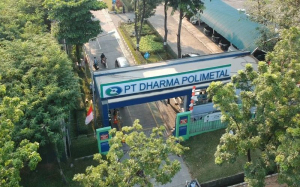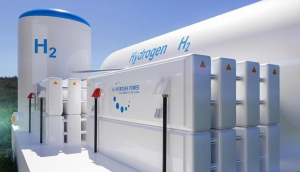Government should provide favorable climate to attract tin downstream investors
To attract investors in the tin downstream industry, Indonesia must guarantee competitive investment costs, affordable gas prices, low logistic costs and infrastructure availability. President Director of state-owned tin mining company PT Timah Tbk., Achmad Ardianto, said investors in the tin downstream industry would seek a location with reasonable capital or minimal investment costs.
"The question is whether Indonesia has a low capital cost or cheap investment cost compared to other countries," he said during a discussion themed "Towards energy independence and downstream mining industry in Indonesia" on February 23, 2023.
Ardianto explained that Indonesia has a strong comparative advantage as it has tin, nickel, coal and gold. However, the government needs to create a competitive advantage. "All players worldwide such as LG, Samsung, Toyota and Honda, are eager to invest in Indonesia if the capital cost is cheap. If it takes a high-cost capital, they would not want to stay here even though they will keep coming back because the raw materials are in Indonesia," he said.
Regarding the development of the tin downstream industry, he said Timah had extensive discussions with potential investors. The problem is that investors are seeking competitive costs in investment, gas prices and logistics as well as the availability of infrastructures.
"If the government can respond to those concerns by issuing the right regulations, combined with export and import regulation and also adapt the efforts to encourage, we believe investors will automatically come to the domestic downstream industry," Ardianto said.
Added value for investors
Ardianto explained that tin was a unique mineral because the development of current technology in the sector of transportation, telecommunication and defense would need tins. Tins are the most efficient and effective weak current electric conductors until now. However, the needs of the tins for technologies need to be more massive. It means that the number of tins is not dominant in one product.
Many analysts said that tins are future metals despite the small consumption of tins in one product element. The majority of tin consumption is for solder tins, which means electronic products, mobile phones and electric vehicles will need tins. Tin chemicals can be used as stabilizers, polymers and allies for the PVC, plastic and textile industries.
In Ardianto's opinion, if the government could attract investors to develop the tins downstream industry, it would be a good opportunity for Indonesia to optimize the added value from tin metal, open jobs and guarantee its existence in the global tins industry.
"There will be many multiplier effects [from the tin downstream industry] from jobs, high tech, transfer of knowledge, infrastructure and other things. It will put Indonesia in a strong position for future technology," he said.
Read also: Jokowi insists to promote downstream nickel industries despite loss at WTO
Indonesia can secure the added value from processing tin sands into pure tin which is 1.4 times of the added value. Meanwhile, pure tins processed into second tiers, like solder, chemical and tin plates, give 1.1 to 1.7 times of added value.
The government, Ardianto said, would need to have the right strategy to develop the downstream industry only until it manufactures raw materials that produce tin solders, tin chemicals or tin plates. Or, Indonesia wants to go further downstream to create semiconductors and electric vehicles and make the battery and solar panels.
"It needs the right policy and the right execution," he commented.
Domestic market absorption
Ardianto said the tin domestic consumption was still limited. Currently, Indonesia produces 70,000 tons of tin but the domestic consumption is only around 5,000 tons or 7% of the production. Most tin's downstream products are solder tins, tin plates and tin chemicals, with stagnant growth in 2022.
"The stagnation is caused by the global COVID-19 pandemic and the geopolitical tension, especially the Russia-Ukraine war that caused a jump in energy costs. The jump in energy costs has made European countries prioritize the use of their domestic industry. Consequently, many industries terminate their products that use tins," he elaborated.
Read also: Counting the days for minerals ore export total ban
Ardianto explained that if the government fully banned pure tin export, the domestic market must absorb the products. If the domestic market failed to absorb the pure tins, producers would have obstacles in their production.
"There will be a huge problem especially in the form of tax and non-tax state revenues in producing pure tins. The government needs a strategy to orchestrate downstream implementation, and the coming of investors in the downstream industry can conduct the export ban. As a consequence, we can optimize the raw materials that we have for domestic markets," he said.
The government should encourage the development of the downstream tin industry if it bans the export of pure tin. One of the problems in developing the domestic tin downstream industry is its different character from the upstream industry.
In the upstream industry, tins are a commodity whereas, in the downstream industry, tins are semi-business to consumers. It means the role of brand and marketing is essential. The different characteristics have made investors in the downstream industry have other features than investors in the upstream sectors.
"If we want to encourage the downstream industry, we have to attract investors familiar with markets, sales and trading so they can create products with certain brands and market the products with certain marketing methodologies," Ardianto said.
Citing an example, he explained that in 2008, Timah established a subsidiary named PT Timah Industri, which produces solder and chemical tins. The problem is the brand. PT Timah is a manufacturing hub of OEM Company, one of the world's biggest solder tin producers. However, Timah launched its own brand Bankaesa, which is less prevalent compared to the market leader. Timah needs the right marketing campaign and strategy to compete with the market leader.
"This is the problem of Timah. For a while, Timah has been growing as an upstream industry that produces a commodity, not semi-consumer products that need a marketing campaign," Ardianto concluded.
Already have an account? Sign In
-
Start reading
Freemium
-
Monthly Subscription
30% OFF$26.03
$37.19/MonthCancel anytime
This offer is open to all new subscribers!
Subscribe now -
Yearly Subscription
33% OFF$228.13
$340.5/YearCancel anytime
This offer is open to all new subscribers!
Subscribe now






